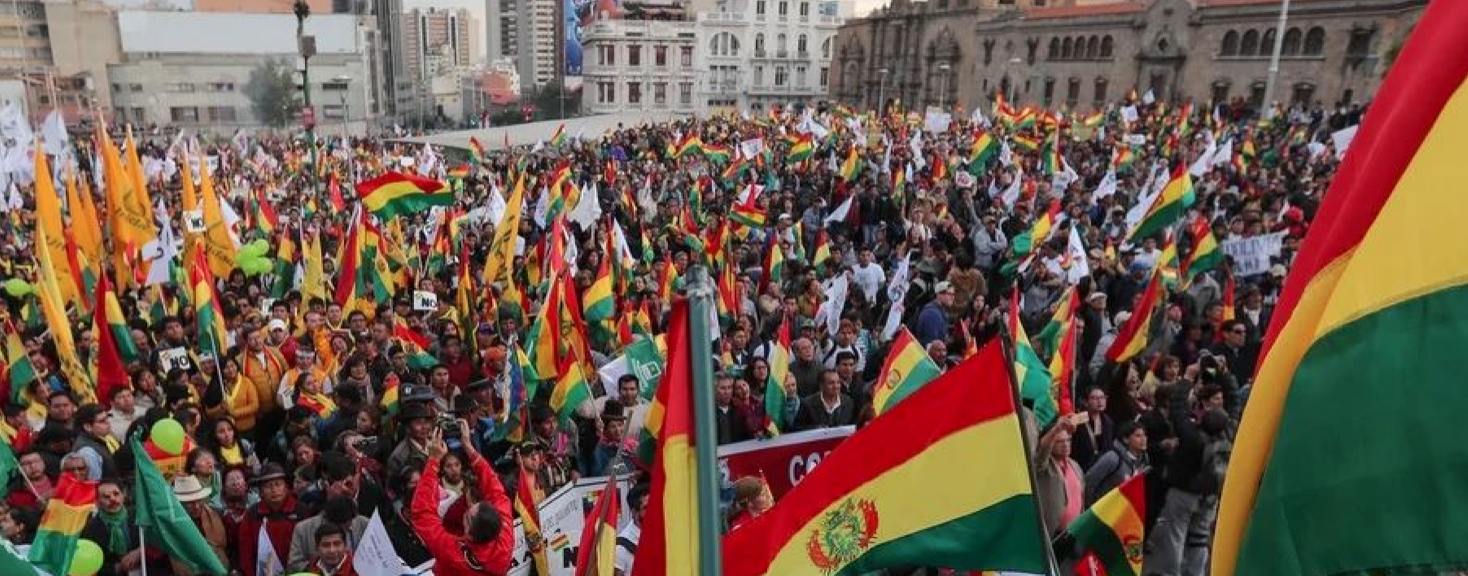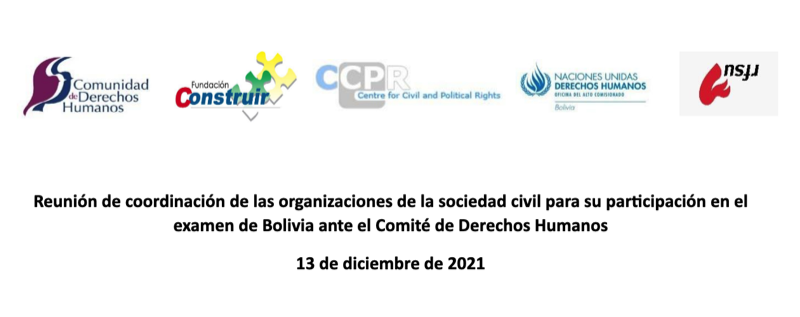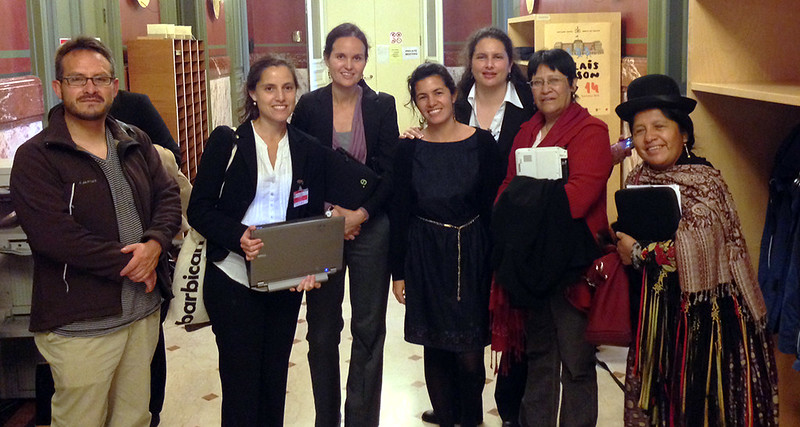Bolivia: Political interference, prison overcrowding and GBV questioned by the Committee
Published on 25 Mar 2022, 04:00 PM
On 8-10 March 2022 Bolivia appeared online before the Human Rights Committee for the fourth time since its ratification back in 1982
 Review of Bolivia by the Human Rights Committee
Review of Bolivia by the Human Rights Committee
Corruption, political interference and independence of the judiciary
On 8, 9 and 10 March 2022 Bolivia appeared before the Human Rights Committee for its fourth state review. Some of the issues high on the agenda were corruption, political interference and independence of the judiciary. Specific concerns were raised about many judges and prosecutors having temporary contracts and about the way in which they are currently being selected. To elect judges, the Bolivian Legislative Assembly approves candidates by a two-thirds majority, and this gets enforced by a popular vote. Additionally, the Committee pointed out that 40% of judges have reported being contacted by a public official and the Ministry of Justice often receives political pressure. Consequently the Committee asked which measures were in place to prevent such interference in the judiciary. The delegation stated that judges under the current administration are trained thoroughly, and admitting that there is a need to transform the justice system, for which they welcomed recommendations of the Committee.
The situation in prisons and torture
On the current situation in prisons in Bolivia, an emphasis was put on the health of inmates and the need to reduce the overcrowding. The Committee asked what measures were taken to reduce the number of people in pretrial detention, that make up 65% of all persons deprived of their liberty. The delegation responded by pointing out that overcrowding in prison had fallen from around 200% to 148% due to the construction of new prisons and the expansion of existing prisons, as well as pardoning of women with children, people with disabilities and terminally ill people to reduce inmate numbers.
The delegation also declared that while torture was common under the rule of the transitional Government, the newly elected Government was working to criminalize torture. When asked what mechanisms were available to file complaints against torture, the delegation stated that a telephone line had been opened to report cases of torture. The International Red Cross and human rights institutions investigated cases of torture and 70 police officers were dismissed as a result of these complaints.
Gender based violence and abortion
The issue of violence against women, feminicide and sexual violence was given a prominent place in the dialogue. The Committee noted that the rate of feminicide was the highest in Latin America and that there had been a significant increase in violence against women and sexual violence. At the same time, there appears to only be one conviction on this subject during the whole of 2021. Another question was asked regarding the plans of Bolivia to change its definition of rape, for it to include sexual abuse of minors and between married partners. The delegation admitted that there had been a high rate of violence against women, while pointing out that a Commission was working to prevent feminicide and violence against women.
On the topic of abortion, the Committee asked what steps Bolivia is taking to eliminate the obstacles faced by women to access safe and legal abortion and to prevent women that had an aborting to be prosecuted. The delegation responded that the Ombudswoman has ensured the implementation of the recommendations of international bodies on the subject of access to abortion, and that the first steps are being taken to prevent discrimination against women who had an abortion.
Recommendations of the Human Rights Committee
Concluding Observations on Bolivia's 4th periodic report were released on 30 March 2022. The State party is requested to provide, by 25 March 2025, information on the implementation of the following recommendations:
Violence against women
The State party should intensify its efforts to prevent, combat and eradicate all forms of violence against women and girls. In particular:
a) Allocate the necessary financial, technical and human resources for the prevention, protection, punishment and reparation of violence against women;
b) Ensure that all measures to combat violence against women that are adopted also protect trans women;
c) Facilitate and encourage the filing of complaints by victims; ensure that all acts of violence against women and girls are investigated promptly, thoroughly and impartially; guarantee that the re-victimization of the victims is avoided within the framework of the investigation; that those responsible be prosecuted and punished; and that the victims obtain comprehensive reparation;
d) Review as soon as possible the criminal types of rape and statutory rape of the Penal Code
e) Guarantee assistance to victims
Human trafficking and forced labor
The State party should:
a) Intensify its efforts to prevent, combat and punish human trafficking and forced labor;
b) Ensure that cases of human trafficking and forced labor are promptly, thoroughly and impartially investigated; that those responsible be adequately punished; and that the victims receive comprehensive reparation;
c) Continue and reinforce the prevention and awareness campaigns of the population regarding the negative effects of trafficking, as well as training, specialization and awareness measures for officials and other persons in charge of investigating these crimes and providing protection;
d) Guarantee the allocation of adequate financial, technical and personnel resources;
e) Redouble its efforts to: identify victims of human trafficking and provide them with adequate means of protection and assistance;
f) Accelerate the adoption of the new Plurinational Policy to Fight Human Trafficking and Trafficking, as well as the new Multisectoral Plan to Fight Human Trafficking and Trafficking.
Administration of justice
The State party must:
a) Redouble its efforts to ensure and protect the full autonomy, independence and impartiality of judges and prosecutors. In this regard, it should speed up the process of reforming the justice system;
b) Take measures to prevent, combat and punish acts of corruption;
c) Adopt the necessary measures to correct the provisional status of judges and prosecutors, as well as to ensure that the processes of selection, evaluation, discipline and removal are carried out transparently by an independent body and are based on the law and on public criteria and objectives of suitability, merit and professional background;
d) Ensure the full geographic coverage of the justice system and that sufficient financial, technical and personnel resources be assigned to it;
e) Guarantee that the Plurinational Public Defense Service has adequate financial, technical and personnel resources.
Here you can find all the recommendations given by the Committee in the Concluding Observations.
 Review of Bolivia by the Human Rights Committee
Review of Bolivia by the Human Rights Committee

.png)




